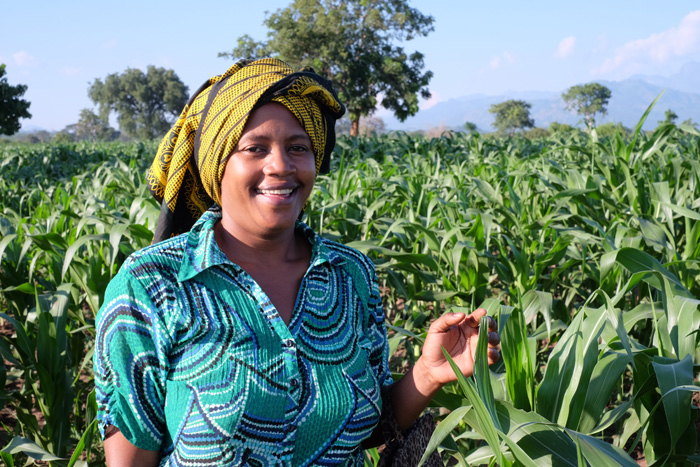
Global Report on Results

Mercy Mkuchu says she thanks God for her thriving field of corn. Photo: Jakob Fagerland / Norwegian Church Aid
NCA empowers smallholders through value chain development
Building on NCA’s livelihood work, the development of a new Economic Empowerment programme (20162020) includes piloting key initiatives in 2015 and 2016. With a focus on Eastern Africa and new partnerships with private sector actors, the objective of the pilot is to explore scalable models for rights-holders to secure entrepreneurial opportunities and sustainable employment. Progress on the first year of the pilot in Tanzania is presented in the following case.
Lack of productivity and unnecessarily low harvest is common amongst the poor and hungry in Tanzania - 80% of which are food producers. If they have any surplus to sell, farmers access the market independently, on worst terms, and typically through middlemen. Failure to access accurate information, training and financial services upholds poor agro-practices and low investments in improved seeds and fertiliser, resulting in low production and no profit. This poverty trap is worsened by the fact that 70% of farmers are smallholders, the majority being women.
Most poor are clustered in a few sub-sectors of agriculture with corn production being the largest. By analysing the corn value chain, NCA and partner Anglican Church Diocese of Morogoro (ADCM) are exploring sustainable profit potentials for smallholders. Organised into groups, farmers utilise the benefits of collective procurement of seeds and fertiliser, on-the-farm-training, storage solutions and market access.
The pilot involved 251 mainly poor female farmers from Kilosa and Kiteto districts. The goal is to increase productivity and improve farmers’ position when it comes to market access, through increasing knowledge of the value chain and adopting more effective agro-practices. NCA’s coordination of relevant knowledge institutions and the private sector has been instrumental in quality assuring various components of the project. Sokoine University of Agriculture and Yara participated in the training of trainers, conducted soil tests and were involved in gathering baseline data. Building on years of experience with transfer of knowledge, ACDM effectively introduced farmers to new agricultural techniques. With knowledge of the benefits of improved seeds and fertiliser, farmers are expected to increase production beyond subsistence farming and make profit gains. NCA has facilitated access to relevant agricultural inputs from Yara and Pannar as farmers utilised their numbers in collective procurement of seeds and fertiliser.
By selling their corn collectively, the women have strengthened their position in approaching the market. Together with World Food Programme (WFP), NCA has facilitated an agreement between the farmers (represented by ACDM) and TanFeed International, including a floor price and a mechanism for upward price correction toward market price. The agreement, which allows farmers to collectively negotiate sales of their produce at terms meaningful to them, can also be used to secure financing for agricultural input for un-bankable smallholders.
Back